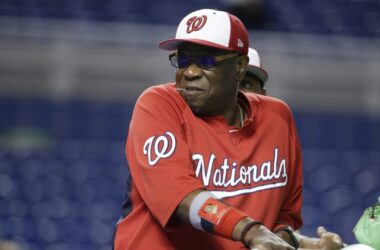On Jan. 31, Jackie Robinson, immortalized in baseball history as the first black player to play in the MLB in over 60 years, would have celebrated his 100th birthday. Baseball has come a long way since Robinson’s major league debut on April 15, 1947. Though the legendary Dodgers second baseman is remembered for his courage and his advocacy for civil rights, the league must do more to honour his legacy.
Since his death, the MLB took easy—but still honourable—steps toward commemoration. In 1997, 25 years after Robinson’s death, then-acting commissioner Bud Selig announced that every MLB team would retire Robinson’s iconic number 42. Seven years later, the league held its first annual Jackie Robinson Day, and, since 2009, every player, manager, and umpire has worn a number 42 jersey on April 15 in his honour.
In 2019, the MLB will celebrate Jackie Robinson Day as they have for the last 14 years. They will hail him as a courageous hero and condemn the prejudice he faced throughout his career. However, these gestures do Robinson a disservice: Racism is still alive and well in baseball.
Black men made up less than 19 per cent of players in 1981, and that number is steadily declining: In 2018, the mark sat at just eight per cent on Opening Day. These figures are equally lackluster in the dugout and clubhouse. Currently, only four of 30 managers and two of 28 general managers belong to racial minorities. Further, baseball fans are, on average, less racially diverse than their football and basketball counterparts, with more than 80 per cent of them being white.
Professional baseball has often assumed an apolitical stance, shying away from involvement in social issues. Such apathy stems from the lack of diversity in baseball culture and contributes to an environment where outspokenness is frowned upon. To the average baseball fan, players are not unique people with thoughts or feelings or personalities; they exist solely for the fan’s entertainment, the team’s success, and as commodities of the greater MLB machine.
Momentum from Robinson’s actions 72 years ago is insufficient to defeat the bigotry that still exists in baseball today. The MLB, claiming its efforts to increase diversity have been successful, is still donating thousands of dollars to racist congresspeople, like Cindy Hyde-Smith, to help keep minor league salaries below minimum wage. They also let offensive gestures and messages go unpunished.
There are a few players, like Nationals pitcher Sean Doolittle and Orioles outfielder Adam Jones, who have explicitly addressed racial issues. Still, the vast majority of players keep quiet. Both the NBA and NFL are predominantly black, which can make it more difficult for those leagues and fans to ignore players’ protests, especially when players speak out together. Baseball, on the other hand, despite having a greater percentage of Latino and Asian players than other professional leagues, is a white man’s sport. Players of colour are more heavily criticized by front offices, the media, and fans, and they are more likely than their white counterparts to face backlash for political comments. Thus, it is the responsibility of white players to support their non-white peers and speak out against injustice in baseball and broader society.
Change is possible for the MLB. League and team executives must realize that there are easy, actionable first steps to take, such as banning racist celebrations and replacing commentators who make offensive remarks, to help make the baseball community more inclusive. Players need to recognize that they are allowed to have a voice on social issues and take a stand for what they believe is right, just as Robinson did.
“As I write this twenty years later, I cannot stand and sing the anthem,” Robinson wrote in his autobiography I Never Had it Made. “I cannot salute the flag; I know that I am a black man in a white world. In 1972, in 1947, at my birth in 1919, I know that I never had it made.”
Somehow, in 2019, these words still ring true. It’s up to the MLB, and its players, to help change the status quo and truly honour Robinson’s legacy.









